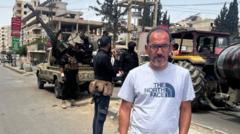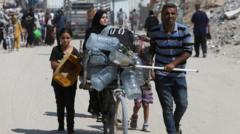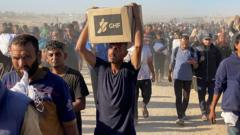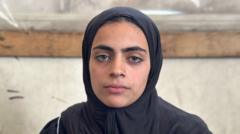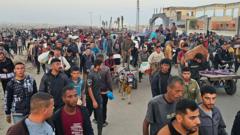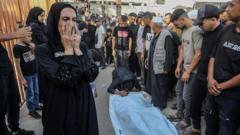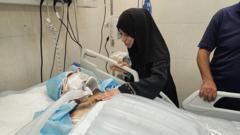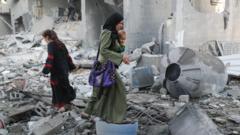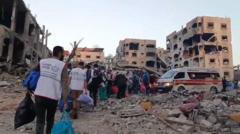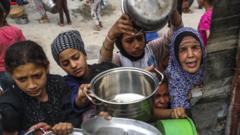An Israeli military strike on al-Ahli hospital has left five dead, including three journalists, leading to fierce criticism from the Anglican Church and the Palestinian Journalists' Syndicate. The Israeli military claims it targeted an Islamic Jihad fighter., while press freedom groups demand immediate access for international media in the region.
Death Toll Rises as Israeli Strike Hits Gaza Hospital, Sparking Outrage
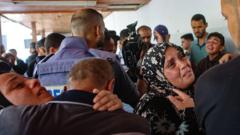
Death Toll Rises as Israeli Strike Hits Gaza Hospital, Sparking Outrage
An Israeli airstrike on al-Ahli hospital in Gaza results in five fatalities, including three journalists, prompting condemnation and renewed calls for press protection.
Five individuals were killed in an Israeli airstrike on al-Ahli hospital, located in Gaza City, according to reports from the Anglican Church, which manages the facility. The deceased included three journalists doing their jobs, a father escorting his son to surgery, and another unidentified individual. The Episcopal Diocese of Jerusalem has condemned the strike "in the strongest possible terms," noting that around 30 people were injured, including hospital staff.
The Palestinian Journalists' Syndicate denounced the operation as a "full-fledged war crime," responding to rising tensions over the treatment of journalists in conflict zones. The Israeli military defended the strike, asserting that they "precisely struck" a Palestinian Islamic Jihad (PIJ) fighter, claiming their actions were aimed at combatting terrorism while alleging that groups misuse the hospital for military operations.
This incident occurred as over 130 global news and press freedom organizations, including the BBC, called for immediate access for international media to Gaza and full protection for Palestinian journalists. The group emphasized that the Israeli government has restricted media access for 20 months, a move they characterized as unprecedented in modern warfare.
Reports indicate that nearly 200 journalists have been killed by the Israeli military, sparking outrage within the international community and a demand for accountability. The Palestinian Journalists' Syndicate identified the deceased journalists as Ismail Badah, a cameraman for PIJ-affiliated Palestine Today TV, Soliman Hajaj, another Palestine Today editor, and Samir al-Refai of the Shams News network. Additionally, at least four more journalists sustained injuries, two of whom are reported to be critically wounded.
Footage from the scene revealed the chaotic aftermath of the strike, with medics scrambling to provide aid to the injured. Eyewitness accounts expressed profound grief and outrage at the targeting of press workers amid ongoing military operations. The Israeli military, however, has historically denied that it intentionally targets journalists.
Gaza's continuing humanitarian crisis remains severe, compounded by military actions; the Hamas-run Civil Defence agency reported that dozens were killed in additional strikes across the region on the same day. Humanitarian access remains contentious, with a US-backed group reopening aid distribution centers after temporary closures, amidst accusations of violations of neutrality and impartiality in aid delivery.
The latest strike adds to the toll from the ongoing conflict, which began after a Hamas-led attack on southern Israel in October that claimed around 1,200 lives. Since then, escalating violence has left over 54,000 casualties in Gaza, including alarming rates of starvation and displacement among the local population, resulting in widespread calls for a ceasefire and protection for humanitarian and press workers.



